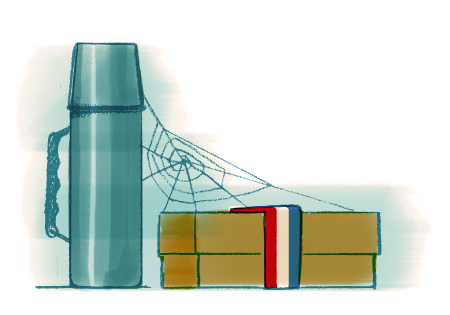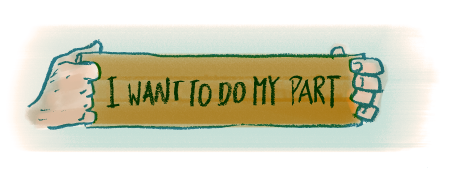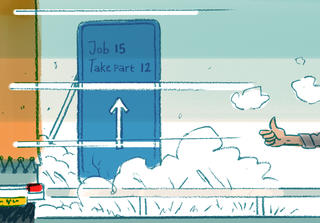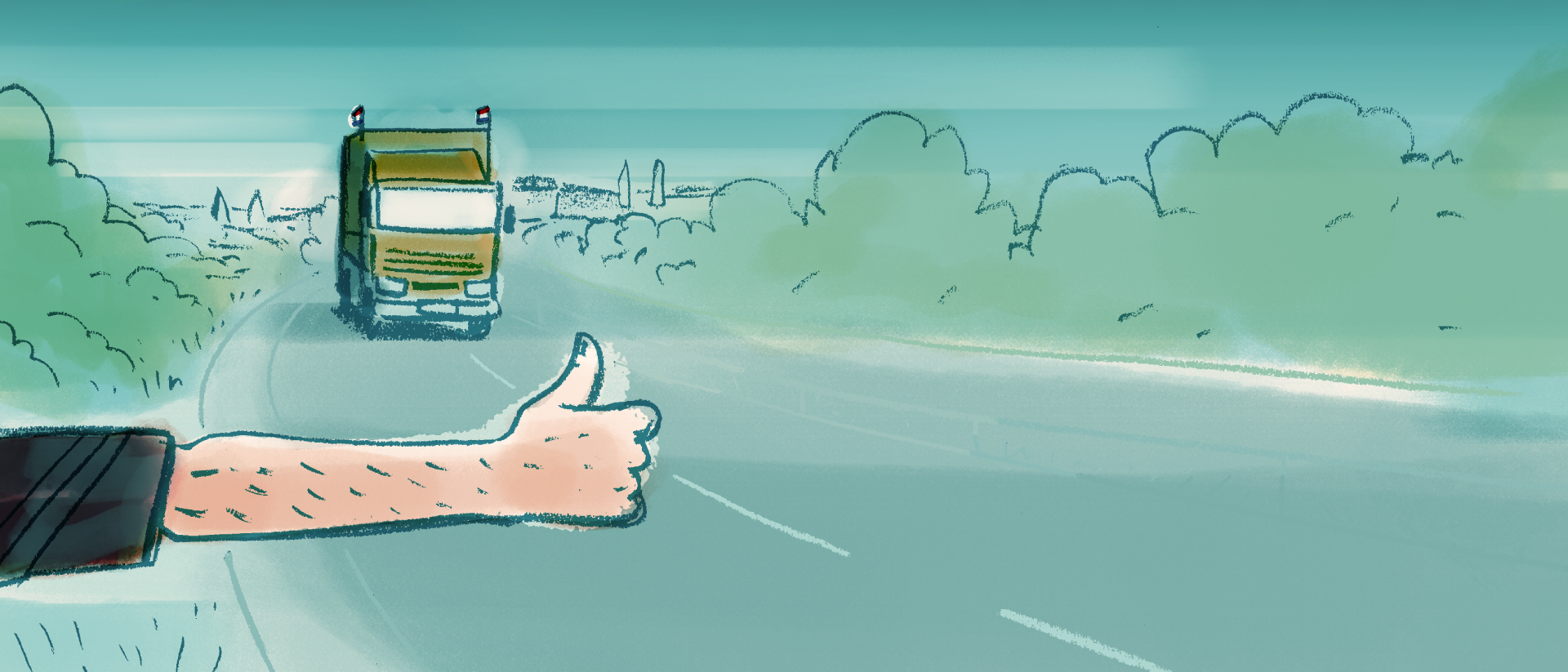Refugees who have received a residence permit in the Netherlands in the last two years would like nothing better than to work for a living. They are happy with the safety they’ve found in the Netherlands, with their assigned housing, and with their welfare benefits. But what they’d rather have – much, much rather – is the chance to earn their own keep. Even if that means working at a low-level position or a job outside their field.

As they look for work in this country, these new arrivals need support and guidance. When asked what they need to help them find a job here, roughly 75% answered: someone to help me navigate the Dutch system. About 60% said they lacked sufficient knowledge of the job market in the Netherlands.
That’s what our research has revealed. Together with a De Correspondent member, over 160 newly-arrived refugees answered a series of questions about work in connection with the New to the Netherlands initiative. The results of our survey are not representative; they provide a starting point for journalistic research.
Nearly all refugees feel that work is incredibly important
How important is getting a job in the Netherlands to you? “Very important”, answered nearly 100% of the newcomers.
We could have predicted as much. Four months ago, we kicked off our research by distributing the first questionnaire. One of the questions was “What would it take to make you feel at home in the Netherlands?” At that point many of the newcomers practically seemed to shout: a job!
“I’m not here to be some freeloader. I want to contribute to this country and work for the money I get
And in answer to the question “What should Dutch people know in order to understand how [refugees] feel, being here in the country?”, we received dozens of variations on the lament “that I don’t want to live off of welfare benefits.” One especially telling response: “I’m not here to be some freeloader. I want to contribute to this country and work for the money I get.”
The vast majority of new arrivals taking part in New to the Netherlands come from Syria. Their homeland is considered “the Germany of the Middle East”: a country of hard-working people known for their strong work ethic. These refugees are eager to roll up their sleeves and show people what they’re capable of.
And they are willing to do practically anything for the opportunity, our research shows. Around two-thirds of the participants – not just Syrian refugees but those of all nationalities – are prepared to take a job that is less suited to their level of education, abilities, and interests. Roughly 40% of those surveyed are prepared to do absolutely any kind of work. Around 80% agrees with the statement “Work that is beneath my talents is better than no work at all.”
Recent experiences haven’t exactly been encouraging
For most of these newcomers, the road to the Dutch job market is lengthy and disorganized. And the experiences of large groups of refugees that came to the Netherlands in the 1990s offer little in the way of encouragement.
Of the 33,000 newcomers who received a residence permit between 1995 and 1999 and were still in the country in 2011, after five years, only half had a job for more than eight hours a week. After fifteen years, approximately one-third had found paid employment for at least 30 hours a week.

So why did the majority fail to find work? The 2016 “Policy Brief No. 4: No time to lose: from reception to integration of asylum migrants” by the Scientific Council for Government Policy gives a number of factors that have to do with the newcomers themselves: low education level, little professional experience and a lack of relevant social networks. Other causes relate to government policy in the Netherlands, such as the lengthy asylum procedure and the civic integration policy.
And, the authors of the report add, the Netherlands doesn’t do much to make it easier for the newcomers. Diplomas earned in certain countries of origin aren’t recognized. “A degree completed in your land of origin offers fewer job prospects than a degree program completed in the Netherlands.”
The authors also refer to discrimination as a factor. “It is safe to assume that as a result of their national origins, refugee groups – like other migrants – will have fewer employment opportunities.”
The most important lesson the Council draws from the experiences with refugees who arrived in the Netherlands in the 1990s is that it takes newcomers far too long to gain traction in the Dutch labor market. This start needs to be faster and better.
The longer you’re out of work, the harder it gets to find a job
Reality, however, is more complicated. The implementation of the faster, better approach supported by the council is moving slowly and encountering hiccups. Valuable time is being lost as a result, delaying the start of the refugees’ search for work.
Employers must be taught how to find and hire refugees with a residence permit
From our research, it’s clear that newcomers are all too aware of the risks of lost time. Around 75% of those asked said they agree with the statement “The longer you go without a job, the harder it is to get one.”
It’s best if refugees with a residence permit start working, or looking for a job, while still attending civic integration classes, say two-thirds of the newcomers who participated in our survey.
The Social-Economic Council also argued in favor of this late last year. Their suggestion: expand newcomers’ opportunities to take part in an internship or traineeship without losing the right to welfare benefits. Remove the obstacles keeping them from volunteering their time. In addition, employers must be taught how to find and hire refugees with a residence permit.
And so, a new government policy: staying means participating
Last year, the Dutch government also came to the gradual realization that newly-arrived refugees could no longer be held solely responsible for finding a job on their own. And that the market won’t take care of this issue by itself.
And so they set aside a total of 500 million euros, distributed over the course of 2016 and 2017, for measures intended to promote the integration of refugees into Dutch society. The motto being: staying means participating.
Lodewijk Asscher, Minister of Social Affairs in the Netherlands, referred to work as one of three pillars supporting successful integration, in addition to language and the “internalization of core values.” He created a Taskforce on Work and Integration of Refugees.
The strategy of this taskforce sounds fairly vague and jargon-y and involves “investing in screening and matching, promoting integration by exchanging knowledge within the chain and reinforcing the network that connects individuals”. Its goal, however, is much clearer: make it faster and better. Like the Scientific Council for Government Policy recommends.
Due to in part to this taskforce’s influence, we’re gradually starting to see targeted policy measures. And the “magical” solution? See to it that Central Agency for the Reception of Asylum Seekers (COA) visits the asylum seekers’ center to interview each and every newcomer, just as soon as they have been issued a residence permit. The conversation should focus on his or her education, work experience, study or career goals and potential network in the Netherlands.
On the basis of this information, the COA will then make a housing recommendation: i.e. identify which region would be most advantageous for the newcomer to live in, in order to maximize his or her chances of finding work. And based on the same information, the city should begin offering volunteer opportunities and study or work-related guidance immediately upon the newcomer’s arrival.
Illustration by Roel Venderbosch

The plans are sound; the implementation could use some work
This is undoubtedly the right approach. Make an inventory of what newcomers have to offer, and what they want, at an early stage – and then support them in their efforts, so they can make the best possible use of their potential. This will hopefully help the current crop of refugees getting a residence permit to find work more quickly.
Still, in past years some 80,000 newly-arrived immigrants have had to make do without this approach. Perhaps it’s possible, even now, to start applying it for their benefit. If we don’t, their search for work may well go awry.
In many cities, the latest batch of newcomers are encountering the more pro-active approach described. Even if, in many places, it’s proving slow to implement. Many times, there’s a lack of knowledge about the job market and educational possibilities. Often, the civil servant who’s supposed to be the designated contact for the newcomers has not been trained in inter-cultural communication. Another commonly-heard complaint is that these officials are unfamiliar with the refugees’ backgrounds.
Many cities have difficulty resisting the temptation to outsource the troublesome task of guidance to employment consultants or reintegration agencies. When they do outsource, quality and effectiveness aren’t always assured.
One De Correspondent member from Friesland, who has been meeting with an Eritrean refugee, shared the following account of the new system of job-finding support. A civil servant told “her” newcomer that labor-market guidance had been cut in 2014 in connection with the new Civic Integration Act, which stipulates that newcomers are responsible for their own integration. But that because the Dutch government had reversed that decision, they said, the refugee would be getting a consultation with someone from a reintegration agency.
“Too bad – without a Dutch diploma, you have to start at level 1
About that conversation, the Correspondent member says: “He was a friendly guy, but the consultation itself was ridiculous. He didn’t ask about goals or interests. In his opinion, no experience and no diplomas equals unskilled labor. He mentioned a local façade-cleaning company that the newcomer could check with, to see if they were hiring. That was eight weeks ago, and the man from Eritrea hasn’t heard back.”
Getting good advice from educational institutions frequently costs newcomers an incredible amount of effort as well. One Correspondent member wrote about attending an open house at the ROC (regional vocational training center) in Tilburg with her Somalian acquaintance. Back in Somalia, this newcomer had graduated from high school and attended six months of higher education. In the Netherlands, she decided on a nursing program at the MBO-4 level. At the ROC, however, she was immediately told: “Too bad – without a Dutch diploma, you have to start at level 1.”
The young Somalian woman was crushed, the Correspondent member told us. “Only later did we run into a representative who actually knew what was what. Her answer: you need to get your Somalian diploma recognized first. If your foreign diploma turns out to have at least a pre-secondary vocational level, you should be able to matriculate at the MBO-3 level here. As long as you’ve also passed your state exam, that is.”
We also get emails from newcomers telling us about how their cities offer workshops and training courses – but that these don’t teach them anything. “We are developing serious concerns about the level of education in the Netherlands,” one person wrote. Other newcomers complain about the so-called “work experience placements” where they feel like all they are is a cheap pair of hands. “A friend of mine is studying to be a dentist. The Rotterdam municipal authorities offered him a job working on the railway, for three ten-hour days a week.”
Some 40% of those who participated in our survey work as volunteers. Many cities encourage this because “it’s so effective in helping people learn Dutch.” Yet cities can tend to lose sight of that goal. One man from Eritrea reports hoeing the dirt in a city park, all by himself. A Syrian immigrant writes that he was assigned to repair toys in a shed with two other Syrians. None of which is a good way to learn Dutch.
In light of this kind of support and advice, it’s a miracle that (as our survey shows) most newcomers remain so optimistic about their chances in the Dutch job market. Nearly two-thirds of those asked said they expect to have a job within two years. Roughly 85% thinks they’re sure to find work eventually. And over half of them want to start their own business.
So much faith in a productive future, so much energy that can help the country grow and prosper. All we need do, in order to turn all this hope into deeds, is lend people a hand in getting started.
—This report is part of the New to the Netherlands initiative, made possible by support from the Dioraphte Foundation. Translated from Dutch by Liz Gorin.
More stories from De Correspondent:
 Mediocre, overcrowded, and overpriced. Welcome to civics class for refugees
Nearly 80,000 newcomers must pass a civic integration exam within three years of entering the Netherlands. Otherwise they face fines, debt, and their residence permits may be revoked. But our research shows that the current policy doesn’t work.
Mediocre, overcrowded, and overpriced. Welcome to civics class for refugees
Nearly 80,000 newcomers must pass a civic integration exam within three years of entering the Netherlands. Otherwise they face fines, debt, and their residence permits may be revoked. But our research shows that the current policy doesn’t work.
 Refugees on their struggle to look ahead while worrying about those left behind
Bound to their homeland. Fearing for friends and family. Being this close to family reunification. Three insights into how things are going for refugees with a residence permit in the Netherlands.
Refugees on their struggle to look ahead while worrying about those left behind
Bound to their homeland. Fearing for friends and family. Being this close to family reunification. Three insights into how things are going for refugees with a residence permit in the Netherlands.
 The hairdresser’s amazing comeback (or why everybody needs a Fatima)
It took Maher Mansour four years to build a business in this country as successful as the one he’d owned back in Syria, before he lost everything. His dream wouldn’t have come true without Fatima El Kaddouri. If only every refugee had a Fatima.
The hairdresser’s amazing comeback (or why everybody needs a Fatima)
It took Maher Mansour four years to build a business in this country as successful as the one he’d owned back in Syria, before he lost everything. His dream wouldn’t have come true without Fatima El Kaddouri. If only every refugee had a Fatima.




